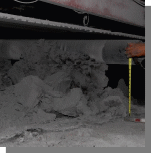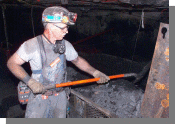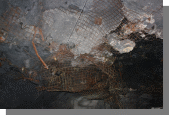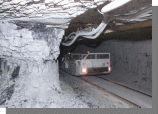Task and Cognitive Task Analysis: Fire Boss
Assessing and Evaluating Human Systems Integration Needs in Mining
Appendix E_Task and Cognitive Task Analysis_Fire boss
Task and Cognitive Task Analysis: Fire Boss
OMB: 0920-0981
APPENDIX E: Task and Cognitive Analysis: Continuous Miner Operator
Form Approved
OMB No. 0920-xxxx
Expires xx/xx/20xx
Subject ID: __________________ Fire Boss CTA Interviewer: _____________
Date: ________________________
Demographics
Number of years mining experience__________
Number of years fire bossing experience ___________
Task Analysis
I am going to ask you a few questions about your job. These questions are about your day to day work routine, what you typically have to do, who you typically work with. I’m interested in knowing about your normal routine.
What do you usually carry into the mine with you? How do you carry these items?
What tasks are you primarily responsible for during a shift?
Who do you typically work with during a shift?
Public reporting burden of this collection of information is estimated to average 2 hours per response, including the time for reviewing instructions, searching existing data sources, gathering and maintaining the data needed, and completing and reviewing the collection of information. An agency may not conduct or sponsor, and a person is not required to respond to a collection of information unless it displays a currently valid OMB control number. Send comments regarding this burden estimate or any other aspect of this collection of information, including suggestions for reducing this burden to CDC/ATSDR Reports Clearance Officer, 1600 Clifton Road NE, MS D-74, Atlanta, Georgia 30333; ATTN: PRA (0920-XXXX).
Describe how you were trained to become a Fire Boss.
Now I am going to ask you to think about a few specific tasks you perform during your day – we will go through these tasks one at a time. I’d like you to think about what specifically you have to do in order to accomplish that task. What I’d like you to do is break that task into its parts and give me a bit of detail about each step. I may ask you to tell me what tools you might use, who may be working with you, and when you might do this – these are just a few examples of questions I might ask you while we go through each of the steps.
Task 1 – Insert the specific task prior to beginning CTA
Think about what you do when you _________________________________________. Can you break this task into less than six, but more than three steps?
1.
2.
3.
4.
5.
6.
Of the steps you have identified, which are the most cognitively challenging (which require you to think a lot?)?
[Prompts: which require you to make judgments? Which require you to make decisions? Which require you to problem solve or think on your feet? Which require you to concentrate a great deal? ]
Task 2
Think about what you do when you _________________________________________. Can you break this task into less than six, but more than three steps?
1.
2.
3.
4.
5.
6.
Of the steps you have identified, which are the most cognitively challenging (which require you to think a lot?)?
[Prompts: which require you to make judgments? Which require you to make decisions? Which require you to problem solve or think on your feet? Which require you to concentrate a great deal? ]
Task 3
Think about what you do when you _________________________________________. Can you break this task into less than six, but more than three steps?
1.
2.
3.
4.
5.
6.
Of the steps you have identified, which are the most cognitively challenging (which require you to think a lot?)?
[Prompts: which require you to make judgments? Which require you to make decisions? Which require you to problem solve or think on your feet? Which require you to concentrate a great deal? ]
Knowledge Elicitation
During the knowledge elicitation, I am going to ask you to think about the tasks we talked about just a few minutes ago – I’ll remind you what the tasks are when we get started. I am going to ask you some more specific questions about those tasks. there are no right or wrong answers to these questions. I am looking for information about how you see your work environment, what information is important for you to successfully (safely and productively) get the job done and your thoughts on how you use your skills while you do your job.
***I may also ask you to think about how a new fire boss (a guy who hasn’t been doing the job for very long) may do the job differently. I am doing this because your experience gives you a different perspective than a newer guy and you may do the job in a different.
Task 1
____________________________________________________________________________________
Can you come up with an example of a time when you walked into the middle of a situation while you were ______________ and knew exactly how things got there and where they were headed?
Can you give me an example of what is important about the Big Picture for this task? What are the major elements you have to know and keep track of?
Have you had experiences where part of a situation just “popped” out at you; where you noticed things going on that others didn’t catch? What is an example?
When you do this task, are there ways of working smart or accomplishing more with less – that you have found especially useful?
Can you think of an example when you have improvised in this task or noticed an opportunity to do something better?
Can you think of a time when you realized that you would need to change the way you were performing in order to get the job done?
Optional Questions
Can you describe an instance when you spotted a deviation from the norm, or knew something was amiss?
Have there been times when the equipment pointed in one direction, but your own judgment told you to do something else? Or when you had to rely on experience to avoid being led astray by the equipment?
Task 2
____________________________________________________________________________________
Can you come up with an example of a time when you walked into the middle of a situation while you were ______________ and knew exactly how things got there and where they were headed?
Can you give me an example of what is important about the Big Picture for this task? What are the major elements you have to know and keep track of?
Have you had experiences where part of a situation just “popped” out at you; where you noticed things going on that others didn’t catch? What is an example?
When you do this task, are there ways of working smart or accomplishing more with less – that you have found especially useful?
Can you think of an example when you have improvised in this task or noticed an opportunity to do something better?
Can you think of a time when you realized that you would need to change the way you were performing in order to get the job done?
Optional Questions
Can you describe an instance when you spotted a deviation from the norm, or knew something was amiss?
Have there been times when the equipment pointed in one direction, but your own judgment told you to do something else? Or when you had to rely on experience to avoid being led astray by the equipment?
Task 3
____________________________________________________________________________________
Can you come up with an example of a time when you walked into the middle of a situation while you were ______________ and knew exactly how things got there and where they were headed?
Can you give me an example of what is important about the Big Picture for this task? What are the major elements you have to know and keep track of?
Have you had experiences where part of a situation just “popped” out at you; where you noticed things going on that others didn’t catch? What is an example?
When you do this task, are there ways of working smart or accomplishing more with less – that you have found especially useful?
Can you think of an example when you have improvised in this task or noticed an opportunity to do something better?
Can you think of a time when you realized that you would need to change the way you were performing in order to get the job done?
Optional Questions
Can you describe an instance when you spotted a deviation from the norm, or knew something was amiss?
Have there been times when the equipment pointed in one direction, but your own judgment told you to do something else? Or when you had to rely on experience to avoid being led astray by the equipment?
Scenario Based Questions
As you look at the pictures presented below, imagine you are the fire boss in the mine. While you performing your inspections, you encounter the following situations. After you have inspected the pictures, I am going to ask you a series of questions about how you would think and act in each situation.
Scenario 1
Situation A Situation B


Can you describe the differences/similarities between these two situations?
Please identify the major hazards that are present in this scenario.
For each hazard, what were the contributing factors that lead you to identify it as a hazard?
For each major hazard, elicit the following information:
As the fire boss in this scenario, what action, if any, would you take at this point in time?
What do you think is going on here? What is your assessment of the situation at this point in time?
What pieces of information led you to this situation assessment and these actions?
What errors would an inexperienced person be likely to make in this situation?
Scenario 2
Situation A Situation B


Can you describe the differences/similarities between these two situations?
Please identify the major hazards that are present in this scenario.
For each hazard, what were the contributing factors that lead led you to identify it as a hazard?
For each major event, elicit the following information:
As the fire boss in this scenario, what action, if any, would you take at this point in time?
What do you think is going on here? What is your assessment of the situation at this point in time?
What pieces of information led you to this situation assessment and these actions?
What errors would an inexperienced person be likely to make in this situation?
| File Type | application/vnd.openxmlformats-officedocument.wordprocessingml.document |
| Author | CDC User:bme |
| File Modified | 0000-00-00 |
| File Created | 2021-01-24 |
© 2026 OMB.report | Privacy Policy